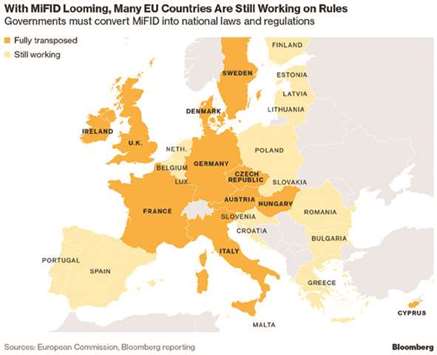More than half of the European Union’s 28 countries are still scrambling to put MiFID II financial-market rules on their books, adding to industry confusion as firms race to comply with the new requirements before the January 3 start date.
In seventeen countries, including Spain, the Netherlands and Portugal, policy makers are still working to convert the revised Markets in Financial Instruments Directive into national law or regulations, according to the European Commission and reporting by Bloomberg. That matters because until it’s on a country’s books, the directive doesn’t directly apply to companies or individuals there.
This last-minute dash adds to the uncertainty for banks and money managers as they brace for an estimated $2bn bill to comply with MiFID II, a sweeping rewrite of trading rules affecting stocks, bonds, derivatives and commodities. It also puts pressure on regulators across the EU to show lenience as the law comes into force.
“All countries have an industry asking their regulator for unofficial leniency,” said Rob Moulton, a London-based partner in financial regulation at Latham & Watkins law firm. “And that is getting unofficially supportive feedback.”
The MiFID II package consists of two main parts. The Markets in Financial Instruments Regulation, or MiFIR, is binding in its entirety and applies directly in all EU countries. The revised directive, MiFID, must be put into national law before it takes effect, a process known as transposition.
“Member states are still continuing their transposition,” Valdis Dombrovskis, the EU’s financial-services policy chief, said on Oct. 17. “It must be said it’s relatively late in the process. Of course from the European Commission’s side we are following very closely this transposition to make sure that its application is uniform across the EU.”
While EU directives are binding as to the result to be achieved, national authorities have some discretion in how they achieve that result. In practice, that means the rules will look a little different in each EU country. It has also allowed for an additional round of industry lobbying to tweak, roll back or delay curbs.
The deadline for transposition of the MiFID directive was July 3. The European Commission, the EU’s executive arm in Brussels, has infringement proceedings pending against the laggards. If a country doesn’t fall into line, it can eventually be taken to court by the commission and even fined.
Most governments contacted by Bloomberg said they expected to have all the necessary regulations in place by January 3, though in Finland, for example, the Finance Ministry said the schedule is “tight but possible.” In Luxembourg, home to many major investment funds, and Belgium, which hosts the EU legislative machinery, national legislation is still in the works. The Latvian regulator said it will ensure that the rules are followed even if the law’s not adopted by the start date.
In Finland, the financial industry has pressed the country’s watchdog to show leniency at the start because the rules aren’t ready and still need to go through parliamentary debate before final approval.
Some regulators have already indicated that they won’t bring the hammer down on day one. The German supervisor BaFin is “looking very closely at which processes are being put in place for the implementation and whether that is happening in a timely fashion,” spokeswoman Anja Schuchhardt said.
“But we are aware that the schedule is tight,” she said. “For that reason, we will maintain a sense of proportion particularly in the beginning phase as regards supervisory measures.”
BaFin this week said it would make use of the leeway granted by MiFIR and allow the delayed publication of data under post-trade transparency rules.
In the UK, the Financial Conduct Authority has said it will act “proportionately” at the beginning and “will not take a strict liability approach” given the scale of the changes.
“We are very aware of how much work many firms have been engaged in for a very long time now in re-tooling and preparing for next year,” Mark Steward, the FCA’s director of enforcement and market oversight, said in a speech last month. “This means we have no intention of taking enforcement action against firms for not meeting all requirements straight away where there is evidence they have taken sufficient steps to meet the new obligations by the start-date.”
The Dutch Authority for the Financial Markets said on Oct. 3 that with national implementation incomplete, there may be uncertainties about parts of the regulations even though firms should know most of what is required.
“It is understandable that, for certain topics, institutions are having difficulty getting ready in time because there is still some lack of clarity,” the supervisor said. “The AFM will take this into account in the way it performs its supervision from January 3, 2018. Where significant regulatory uncertainties are not a factor, we expect market parties to comply with MiFID II as of January 3.”
Meanwhile, national authorities and the European Securities and Markets Authority, the EU regulator that seeks to coordinate standards across the bloc, have already conceded that some of their work further defining rules for commodities and bonds may not be done with enough time before January 3 for the market to adjust.
ESMA has also said that a delay of a key requirement for certain derivatives to be traded on electronic or other platforms may be necessary. The rules still haven’t been completed and policy makers in Washington and Brussels continue to discuss ways of coordinating the standards to prevent a rupture in the $483tn market.

